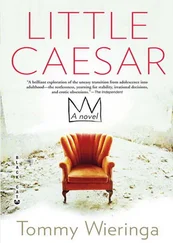He had a predilection for problems that solved themselves, but Beg still felt regret at the idea that he might never know who the emaciated transients were. Budnik’s report had made him curious.
‘Like they were standing beside their mother’s grave, that’s the way they were crying,’ the patrolman had said.
Beg asked what they were crying about.
‘About nothing. I racked my brains trying to figure it out, but I couldn’t see any reason.’
‘No pain, no visible injuries?’
‘Pain, yeah. But not like someone who’s just got a beating. It was different.’
‘Could you describe what they looked like?’ Beg rested his chin on his clasped hands and closed his eyes, so he wouldn’t have to see how the patrolman swayed back and forth in his chair.
‘Like the Jews in the camps, sir. That’s what they looked like. I don’t know how else to put it.’
Beg opened his eyes. ‘And what did they look like, in your view?’
He saw the man — in fact, still only a big boy — searching for words to match the pictures in his head.
‘You know, terrible,’ he said then.
‘Where are you from, officer?’
‘Barsan, sir.’
‘That’s Oblast Grünewald, isn’t it, unless I’m mistaken?’
The constable laughed shyly. ‘Yes, um hum, Grünewald, that’s right. Twenty kilometres from Brstice. You know it?’
Beg withdrew the hand he’d held out and told him he was dismissed. The young man saluted and went. In fact, Beg had been meaning to upbraid him for his negligence on the street that night, but his heart was softened by the dialect of his native region.
He would have Koller do it. Frightened patrolmen were no good to anyone.
CHAPTER TWENTY-SIX.The undead
Grey wood smoke was coming from the shed close to the old train station. A metal pipe had been stuck through the window, so the smoke rose straight up to the rooftop before it blew away. Lev Krasnik, a scrap-metal dealer, leaned his motor scooter and its trailer against a wall and walked over to the storage depot. He pressed his nose against the windowpane. The glass was dirty; something had been put in front of it on the inside — he couldn’t see a thing. Krasnik went to the door and gave it a little shove. He pushed harder, and something behind the door gave a bit. The crack was wide enough to look through now. It was a dim, deep space, and it stank inside.
‘Hello?’ he said. ‘Anybody there?’
He leaned against the door with his full weight, and then he was inside. The dank smell of rotting, faeces, and smoke took his breath away. Beside the window was a makeshift woodstove; the flickering glow from its belly illuminated the coffins someone had stored here. In front of it lay two long bundles. He strained his eyes to make them out — people, those were people lying there. In two lidless coffins on the floor, he saw human forms as well. He wanted to run, but was frozen to the spot in the semi-darkness. Then he saw the eyes looking at him from beside the stove: they belonged to a man sitting on the floor. He was wrapped in blankets, looking at Krasnik motionlessly. ‘Holy Mother of God,’ the scrap dealer whispered, and made the sign of the cross.
The man leaned forward and swept together some splinters from the floor. He tossed them in the fire, and it flared up. Krasnik saw splintered wood all over the floor; they had chopped coffins to pieces for firewood.
The mouth of the man by the fire formed words that Krasnik couldn’t make out. It was an old voice, like cracked dinnerware. Krasnik swallowed a lump of saliva and said: ‘Sorry, I didn’t get that.’
‘Close the door,’ the man said. ‘It’s cold.’
‘Yes, of course, yes. Sorry.’
He took advantage of the moment to hurry out of the shed. His hands shaking, he tried to pull the door shut from the outside, but the lock had been forced and the door wouldn’t close completely. Krasnik stepped inside and took a wedge of wood from the floor.
‘Sorry,’ he said, bent over and peering into the darkness, ‘but it won’t stay closed.’
Then he was outside again, where he jammed the splinter between door and threshold. Now it remained shut.
On his scooter, decked with frozen autumnal mud, he drove to police headquarters as fast as he could. On the way there, he tried to figure out why he had said ‘sorry’ so often. Apparently you couldn’t help but be apologetic when you stood face to face with creatures of the twilight.
Five patrol cars pulled up to the old train station — not all at the same time, but still, five in total, giving their occupants a rare feeling of urgency. Sergeant Koller was in charge. He had gone to work that morning with a nagging pain in his lower back; he had been planning to consult a physical therapist about it later in the day. But before he could leave the building, the unpleasant news came in that someone had apparently found the drifters.
The police station buzzed like a hive, stories large and small zooming around constantly. Koller knew he was about to play a leading role in one of the big stories of the day — one told with the relish of sensation but also with a superstitious sort of concern.
Still sitting in the car, he watched the smoke rising from the chimney pipe. Action, he thought, but the word only made him feel abysmally tired. For a moment he considered firing a teargas canister into the shed, but there was nothing to justify such overkill.
Minutes later, six men stormed into the shed. The beams from their heavy police flashlights swept around the half-darkened space. Koller was the last to enter. He flipped the switch beside the door. A fluorescent tube popped on overhead.
One policeman stood waving his gun and screaming in mad fear at a woman in a coffin. ‘Get out of there, goddamn it!’
There were five of them in all. The men were handcuffed; the woman and a boy were dragged out of their coffins and pinned to the floor. They had lined their beds with straw and rags.
‘Man, does it stink in here,’ another policeman said. Koller nodded. The room gave off a deadly stench.
The boy’s wrists were as thick as sticks. A wolf boy — he struggled so hard they could barely restrain him. He spat and cursed.
‘Tape him,’ Koller said.
The boy’s mouth disappeared behind a strip of duct tape.
The others submitted calmly to their arrest. None of them spoke a word. The only sounds were the guttural noises coming from the boy’s taped mouth. Koller shook his head. What was the world coming to when children behaved like that?
That afternoon, the hive buzzed even louder than usual. Everyone wanted to see them; the cell block was a popular attraction. It wasn’t the state of neglect that shocked them — after all, human flotsam washed up here all the time. No, it was the face of starvation.
After they’d all had their turn, Beg went down to the basement. His footsteps echoed in the stairwell. Pieces of the concrete steps had broken off, so you had to watch your footing. Beside the cells was the shooting range. You could hear the shots through the walls. The red warning-light above the door, which was supposed to be lit when the range was in use, was still broken.
He rang, and the door to the cell complex opened with a click.
‘Okay, show me what we’ve got,’ he said to the guard.
The man removed his earplugs. ‘What?’
‘The transients.’
The guard walked out in front of him. He turned to Beg. ‘I have two of them in here. Well, see for yourself.’
The door swung open.
‘Holy Christ, what a stench,’ Beg mumbled.
‘Koller said I shouldn’t hose them down. Not till you’d seen them, that’s what he said.’
Patrolman Budnik’s comparison with Jews in the camps had been accurate. The men were alive, and that was all you could say. When they came in, one of them lifted his head from the cot and looked at him, his eyelids red and inflamed. The other one remained motionless. Death’s heads. Cheekbones jutting sharply from beneath their beards.
Читать дальше











